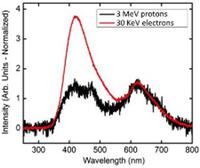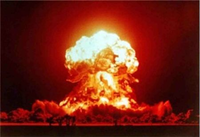-
Space radiation detection technology to be used for homeland security
Common radioactive sources emit gamma rays while nuclear bomb material emits both gamma rays and neutrons; because neutrons and gamma rays are electrically neutral, it is difficult to ascertain properties such as the direction of origin or energy level of the radioactive source; University of New Hampshire scientists are re-engineering instruments originally built for detecting radiation in space for homeland security purposes
-
-
New international plan to tackle cyber crime, make Internet safer
A new international plan to tackle cyber crime has been launched; the new research roadmap has been developed by leading international cyber security researchers along with industry and government experts, and it aims to help make the Internet of tomorrow a safe and secure platform which is vital for global economic growth and societal development
-
-
Training the nuclear forensics experts of the future
Ten percent of the U.S. experts in nuclear and radiochemistry are at or nearing retirement age, according to a recent report from the National Academies of Science; meanwhile, not enough students are being trained to take their places; undergraduate summer programs in nuclear forensics and nuclear chemistry aim to replenish the ranks
-
-
A third Bell 412 helicopter delivered to NYPD for counterterrorism missions
The NYPD dedicated many hours to designing the specifications of the department’s third Bell 412 to meet the diverse needs of the police department; one of the counterterrorism additions to the Bell 412 is a radiation detection system that can identify radiation signatures from an altitude of 200 feet in an effort to protect the city from nuclear bomb threats
-
-
More effective radiation detection of cargo, baggage

A new technique for radiation detection that could make radiation detection in cargo and baggage more effective and less costly for homeland security inspectors; the novel detection method relies on spectral shape discrimination (SSD), taking advantage of a new class of nanoporous materials known as metal-organic frameworks (MOFs)
-
-
Experts: stronger regulation of military, civilian nuclear programs required

All nuclear energy and weapons programs should be independently regulated and subject to rigorous peer review, according to three experts on nuclear policy who held high office in different U.S. administrations; they note that despite international diplomatic efforts to prevent the proliferation of nuclear weapons and ensure that nuclear material is protected against theft, there is growing apprehension about terrorists acquiring weapons or nuclear material
-
-
Nuclear weapon simulations show performance in molecular detail
U.S. researchers are perfecting simulations that show a nuclear weapon’s performance in precise molecular detail, tools that are becoming critical for national defense because international treaties forbid the detonation of nuclear test weapons
-
-
TASC wins three task orders from DNDO
TASC, Inc. was awarded three task orders by DHS to provide its Domestic Nuclear Detection Office (DNDO) with advanced systems engineering and integration and other decision-support services. The task orders are valued at a total of $54 million, including base and option years
-
-
Detecting a North Korea nuclear test
The monitoring tools that scientists have available to them to detect a nuclear test have improved in quality and quantity since North Korea last tested a nuclear weapon in 2009; the Comprehensive Test Ban Treaty Organization (CTBTO) has a total of 287 detection facilities available, consisting of 157 seismic monitoring stations, forty-five infrasound stations, sixty-five radionuclide stations, and ten hydroacoustic stations
-
-
Novel radiation detection technology to thwart nuclear terrorism
Researchers at the Georgia Tech Research Institute (GTRI) are developing ways to enhance the radiation-detection devices used at ports, border crossings, airports, and elsewhere; the aim is to create technologies that will increase the effectiveness and reliability of detectors in the field, while also reducing cost
-
-
Cost of a dirty bomb attack in L.A. would reach $16 billion

A dirty bomb attack on downtown Los Angeles’ financial district could severely affect the region’s economy at a cost nearly $16 billion, fueled primarily by psychological effects which could persist for a decade
-
-
INCOM to commercialize Argonne’s detection technology
Microchannel plate (MCP) detectors are used for detection of particles (electrons or ions) and impinging radiation (ultraviolet radiation and X-rays); this is an important technology for a variety of imaging applications ranging from medicine and physics to national security
-
-
U.S. nuclear industry strong safety performance in 2011
Studies show that the U.S. nuclear power industry achieved strong safety performance in 2011; U.S. nuclear energy facilities in 2011 recorded the lowest number of unplanned shutdowns in more than a decade
-
-
International collaborative effort to develop better radiation detection tool
In mid-February, the Flash Portal Project was launched with the aim of furthering the development and testing of a new technology to detect shielded nuclear materials
-
-
Traces of Japan’s nuclear reactor explosions found in New Hampshire
Dartmouth College researchers have found evidence of Japan’s Fukushima Daiichi nuclear reactor explosions in Hanover, New Hampshire
-
- All
- Regional
- Water
- Biometrics
- Borders/Immig
- Business
- Cybersecurity
- Detection
- Disasters
- Government
- Infrastructure
- International
- Public health
- Public Safety
- Communication interoperabillity
- Emergency services
- Emergency medical services
- Fire
- First response
- IEDs
- Law Enforcement
- Law Enforcement Technology
- Military technology
- Nonlethal weapons
- Nuclear weapons
- Personal protection equipment
- Police
- Notification /alert systems
- Situational awareness
- Weapons systems
- Sci-Tech
- Sector Reports
- Surveillance
- Transportation
Advertising & Marketing: advertise@newswirepubs.com
Editorial: editor@newswirepubs.com
General: info@newswirepubs.com
2010-2011 © News Wire Publications, LLC News Wire Publications, LLC
220 Old Country Road | Suite 200 | Mineola | New York | 11501
Permissions and Policies
Editorial: editor@newswirepubs.com
General: info@newswirepubs.com
2010-2011 © News Wire Publications, LLC News Wire Publications, LLC
220 Old Country Road | Suite 200 | Mineola | New York | 11501
Permissions and Policies
